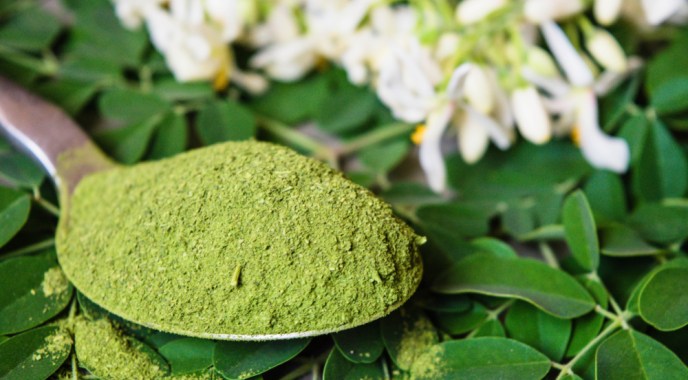Moringa is a drought-tolerant, fast-growing tree that thrives in the most impoverished nations on the planet, such as Niger, West Africa. A highly sought after, highly nutritious tree that grows in one of the poorest, most malnourished countries. The puzzle pieces were all laid on the table, just waiting to be connected, which I found to be incredibly aggravating. After finishing my Peace Corps service in Niger, I channeled that aggravation into a social enterprise called Kuli Kuli that is dedicated to finishing this puzzle. Kuli Kuli assists farmers, primarily women cooperatives in West Africa and Haiti, grow moringa, use it locally and export a portion of their harvest in the form of powder. Once in the states, Kuli Kuli sells the moringa powder in its pure form, in nutrition bars, and wellness shots in 7,000 stores nationwide.
But, one piece of this puzzle was always missing. Despite best efforts, I could not figure out how to source from Niger. Niger is one of the driest and dustiest places on the planet. Landlocked and 80% Sahara desert, one could say it does not scream agricultural wonderland. These harsh environmental factors have kept Nigeriens with little hope for agricultural development, consistently on the list of the world’s poorest nations and unfortunately, until recently, not on Kuli Kuli’s list of suppliers.
MCC and Kuli Kuli Planting Seeds and Linking the Pieces
In 2017, Kuli Kuli was approached by the Millennium Challenge Corporation (MCC), a program of the US State Department. MCC had identified moringa as a climate-smart and economically viable export crop for Niger. In August of 2018, MCC financed a market research trip for myself and a few members of my team to assess the market landscape in Niger and identify potential moringa partners. We came back blown away by the quality of moringa entrepreneurs in Niger and excited to partner with those entrepreneurs and MCC to create high-quality, exportable moringa from Niger.
Why Niger?
According to OECD, about 2.7 million people, or 20% of the population, is living in a state of urgent need for nutritious food in Niger. I recognized this first hand while serving as a Peace Corps volunteer in a rural village in Niger in 2010. As a vegetarian, I quickly realized my diet of millet and corn was not going to cut it. When I began experiencing the early symptoms of malnutrition, members in the village’s health center suggested I include moringa leaves in my diet. Within a week my energy was back and I was back to my routine of morning runs. I was blown away by this tree and knew I had to do something with it.
Unfortunately due to terrorist activity, I was evacuated before I could start a community wide moringa project. Although heart-breaking to cut my project short, the abrupt upheaval out of Niger sparked the birth of my company, Kuli Kuli. The company has grown to be a multi-million dollar social enterprise, making it the biggest moringa company in the United States and likely the world. More impressively, Kuli Kuli has done so all while staying true to its mission of “nourishing you, nourishing the world.” After seven years, the company will finally be able to return to its birthplace.
Kuli Kuli Going Full Circle
In August 2018 when MCC announced its partnership with Kuli Kuli for the initial market research study, I immediately started planning my long awaited trip, this time with an exciting opportunity nobody would have expected when I left seven years prior.
Along with two Kuli Kuli team members, I made the long trek to Niger the month after the agreement was finalized. The goal was to evaluate current moringa growing and processing capabilities and also to build a proposal of best practices for exportation. During my emotional goodbye to my community, I had promised to return. However, never in my wildest dreams did I imagine I would return not only to work with my former village but all across Niger in such a direct, tangible way.
Niger Turning Green
While I was busy building my moringa empire stateside, Niger was unknowingly preparing for the moment I came back. There were more women’s groups and moringa tree farms than we could realistically see in the eight days in country (but that didn’t keep me from trying… 18 meetings later!).
Moringa is a popular choice for international development organizations for a plethora of reasons, but most importantly in the context of Niger…
- Climate. Moringa is an incredibly adaptable tree and can grow in soils intolerable for other crops. It can also withstand long spells of limited water which with global warming has proven to be very important for West Africa, as droughts have become part of the norm. With 80% of the population reliant on agriculture as a primary source of income, it is imperative that there is a switch to climate tolerant crops.
- Supports Women Farmers. As opposed to labor intensive crops or animal husbandry, moringa harvest is accepted as a role that can be performed by either gender, meaning women can participate in the activity without cultural pushback from their communities.
- And most importantly, moringa can promote economic stability that can help to build peace.
Moringa Building Peace in Niger
Political instability is brought on by economic instability. Moringa production has a unique capability of spreading economic prosperity across different ages, religions, climates, political and socio-economic groups. The tree provides villages with nutritious food, richer soil, healthier air and a sustainable source of income. Moringa grows quickly in difficult conditions, providing a potentially life-saving leaf– there is no greater metaphor for creating peace in a country challenged with instability.
Niger has the highest annual population growth at 4% and is currently experiencing a youth bulge. A shocking 75% of the population is under 25 years old, and a majority of this young population is looking for work in a job market that is simply too small and underdeveloped to support this youth bulge. As Niger’s youth population continues to grow, both the food supply and the job market need to grow with it. The low start-up costs and maintenance of moringa farms make it a lucrative business that youth across Niger can partake in.
Niger is Close to Home
It is in Niger that I fell in love with moringa, West Africa, and the idea of social entrepreneurship. Kuli Kuli is dedicated to Niger; accordingly, it seems fitting for it to come full circle and to provide social and economic prosperity to the place where it all started.
MCC is equally as invested in working in Niger, as MCC is dedicated to finding sustainable, long-term solutions to the most pressing of needs. Starting in the summer of 2016, the Nigerien government and MCC agreed to a Sustainable Water and Agriculture Compact that is focused on reliable access to water, markets and redesigning the business regulatory system.
A Story to Be Repeated
Moringa is known in many countries as the “tree of life.” Kuli Kuli is excited to pilot a model for sustainable growth and economic development in Niger that can be scaled around the world.
Головні новини Seeds та агроідеї для зростання вашого бізнесу в Telegram Facebook Instagram
Youtube та Підписуйтесь!



